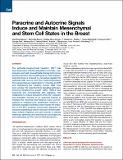| dc.contributor.author | Scheel, Christina | |
| dc.contributor.author | Eaton, Elinor Ng | |
| dc.contributor.author | Chaffer, Christine L. | |
| dc.contributor.author | Reinhardt, Ferenc | |
| dc.contributor.author | Kah, Kong-Jie | |
| dc.contributor.author | Bell, George | |
| dc.contributor.author | Guo, Wenjun | |
| dc.contributor.author | Rubin, Jeffrey | |
| dc.contributor.author | Richardson, Andrea L. | |
| dc.contributor.author | Weinberg, Robert A. | |
| dc.contributor.author | Li, Sophia | |
| dc.contributor.author | Weinberg, Robert A | |
| dc.date.accessioned | 2014-12-10T19:33:28Z | |
| dc.date.available | 2014-12-10T19:33:28Z | |
| dc.date.issued | 2011-06 | |
| dc.date.submitted | 2011-02 | |
| dc.identifier.issn | 00928674 | |
| dc.identifier.issn | 1097-4172 | |
| dc.identifier.uri | http://hdl.handle.net/1721.1/92261 | |
| dc.description.abstract | The epithelial-mesenchymal transition (EMT) has been associated with the acquisition of motility, invasiveness, and self-renewal traits. During both normal development and tumor pathogenesis, this change in cell phenotype is induced by contextual signals that epithelial cells receive from their microenvironment. The signals that are responsible for inducing an EMT and maintaining the resulting cellular state have been unclear. We describe three signaling pathways, involving transforming growth factor (TGF)-β and canonical and noncanonical Wnt signaling, that collaborate to induce activation of the EMT program and thereafter function in an autocrine fashion to maintain the resulting mesenchymal state. Downregulation of endogenously synthesized inhibitors of autocrine signals in epithelial cells enables the induction of the EMT program. Conversely, disruption of autocrine signaling by added inhibitors of these pathways inhibits migration and self-renewal in primary mammary epithelial cells and reduces tumorigenicity and metastasis by their transformed derivatives. | en_US |
| dc.description.sponsorship | National Cancer Institute (U.S.) (CA12515) | en_US |
| dc.description.sponsorship | National Cancer Institute (U.S.) (DE020817) | en_US |
| dc.description.sponsorship | Massachusetts Institute of Technology. Ludwig Center for Molecular Oncology | en_US |
| dc.description.sponsorship | Breast Cancer Research Foundation | en_US |
| dc.description.sponsorship | Dana-Farber/Harvard Cancer Center. SPORE | en_US |
| dc.description.sponsorship | United States. Dept. of Defense. Congressionally Directed Medical Research Programs. Breast Cancer Research Program (Idea Award) | en_US |
| dc.description.sponsorship | Samuel Waxman Foundation | en_US |
| dc.language.iso | en_US | |
| dc.publisher | Elsevier | en_US |
| dc.relation.isversionof | http://dx.doi.org/10.1016/j.cell.2011.04.029 | en_US |
| dc.rights | Article is made available in accordance with the publisher's policy and may be subject to US copyright law. Please refer to the publisher's site for terms of use. | en_US |
| dc.source | Elsevier | en_US |
| dc.title | Paracrine and Autocrine Signals Induce and Maintain Mesenchymal and Stem Cell States in the Breast | en_US |
| dc.type | Article | en_US |
| dc.identifier.citation | Scheel, Christina, Elinor Ng Eaton, Sophia Hsin-Jung Li, Christine L. Chaffer, Ferenc Reinhardt, Kong-Jie Kah, George Bell, et al. “Paracrine and Autocrine Signals Induce and Maintain Mesenchymal and Stem Cell States in the Breast.” Cell 145, no. 6 (June 2011): 926–940. © 2011 Elsevier Inc. | en_US |
| dc.contributor.department | Massachusetts Institute of Technology. Department of Biological Engineering | en_US |
| dc.contributor.department | Massachusetts Institute of Technology. Department of Biology | en_US |
| dc.contributor.department | Whitehead Institute for Biomedical Research | en_US |
| dc.contributor.department | Ludwig Center for Molecular Oncology (Massachusetts Institute of Technology) | en_US |
| dc.contributor.mitauthor | Li, Sophia | en_US |
| dc.contributor.mitauthor | Kah, Kong-Jie | en_US |
| dc.contributor.mitauthor | Weinberg, Robert A. | en_US |
| dc.relation.journal | Cell | en_US |
| dc.eprint.version | Final published version | en_US |
| dc.type.uri | http://purl.org/eprint/type/JournalArticle | en_US |
| eprint.status | http://purl.org/eprint/status/PeerReviewed | en_US |
| dspace.orderedauthors | Scheel, Christina; Eaton, Elinor Ng; Li, Sophia Hsin-Jung; Chaffer, Christine L.; Reinhardt, Ferenc; Kah, Kong-Jie; Bell, George; Guo, Wenjun; Rubin, Jeffrey; Richardson, Andrea L.; Weinberg, Robert A. | en_US |
| dc.identifier.orcid | https://orcid.org/0000-0002-0895-3557 | |
| mit.license | PUBLISHER_POLICY | en_US |
| mit.metadata.status | Complete | |
